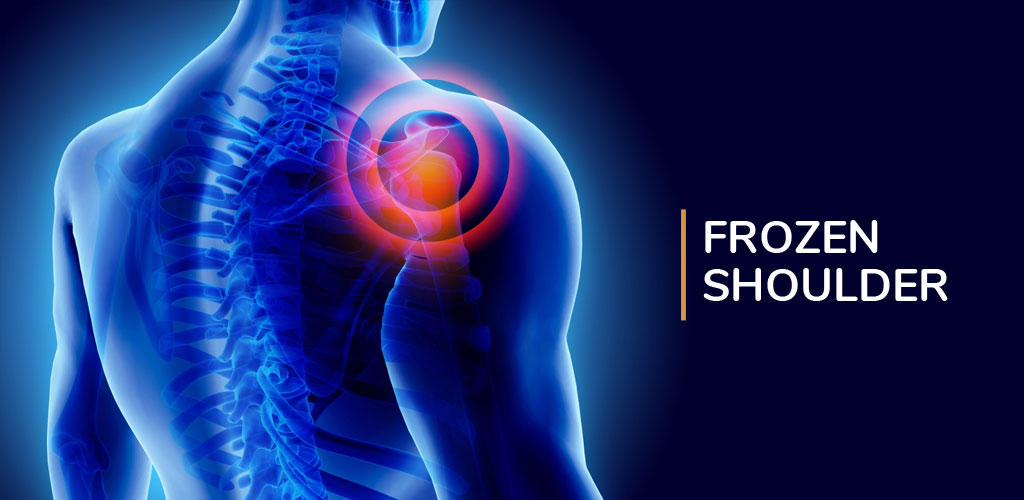
Frozen Shoulder Treatment
Treat Your Shoulder
Frozen shoulder, also known as adhesive capsulitis, is stiffness, pain, and limited range of movement in your shoulder. It may happen after an injury or overuse or from a disease such as diabetes or a stroke. The tissues around the joint stiffen, scar tissue forms, and shoulder movements become difficult and painful. The condition usually comes on slowly, then goes away slowly over the course of a year or more.
Inside Story
Your shoulder is a ball-and-socket joint made up of three bones: your upper arm bone (humerus), your shoulder blade (scapula), and your collarbone (clavicle). The head of the upper arm bone fits into a shallow socket in your shoulder blade. Strong connective tissue, called the shoulder capsule, surrounds the joint. To help your shoulder move more easily, synovial fluid lubricates the shoulder capsule and the joint.
In frozen shoulder, the shoulder capsule thickens and becomes tight. Stiff bands of tissue — called adhesions — develop. In many cases, there is less synovial fluid in the joint.
Causes
- Pain in the shoulder
- Injury to the shoulder
- Chronic health condition, such as diabetes or a stroke.
- Any shoulder problem can lead to frozen shoulder if you do not work to keep full range of motion.
- Diabetes. Frozen shoulder occurs much more often in people with diabetes, affecting 10% to 20% of these individuals. The reason for this is not known.
- Other diseases- hypothyroidism, hyperthyroidism, Parkinson's disease, and cardiac disease.
- Immobilization -Frozen shoulder can develop after a shoulder has been immobilized for a period of time due to surgery, a fracture, or other injury.
- Most often in people 40 to 70 years old.
- More often in women (especially in postmenopausal women) than in men.
- Most often in people with chronic diseases.
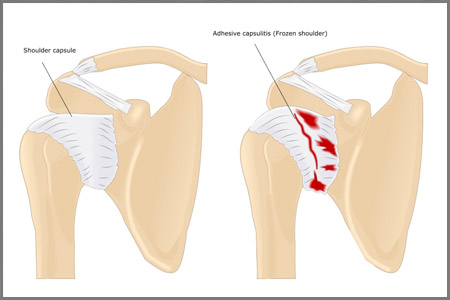
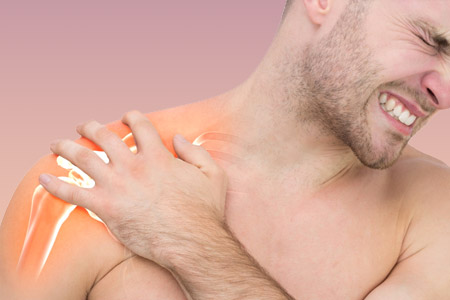
Symptoms
- Pain due to frozen shoulder is usually dull or aching.
- Pain can be worsened with attempted motion.
- The pain is usually located over the outer shoulder area and sometimes the upper arm.
- Restricted motion or stiffness in the shoulder.
- Affected individual cannot move the shoulder normally.
- Motion is also limited when someone else attempts to move the shoulder for the patient.
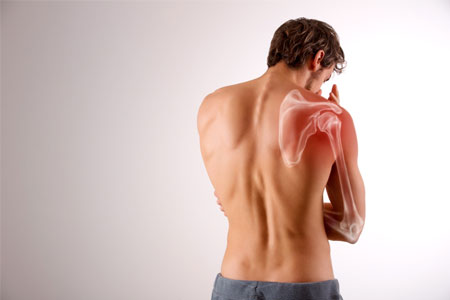
Stages in frozen shoulder
Stage one: In the “freezing” stage, the patient develops a slow onset of pain. As the pain worsens, the shoulder loses motion. This stage may last from six weeks to nine months.
Stage two: The “frozen” stage is marked by a slow improvement in pain, but the stiffness remains. This stage generally lasts four months to nine months.
Stage three: The final stage is the “thawing,” during which shoulder motion slowly returns toward normal. This generally lasts five months to 26 month.
Examination
Physical examination -
Your doctor may suspect frozen shoulder if a physical exam reveals limited shoulder movement.
Radiograph -
An X-ray may be done to see whether symptoms are from another condition such as arthritis or a broken bone.
Goals of treatment
- To reduce pain
- To reduce stiffness
- To increase joint mobility
- Restore the level of function you had before the injury
- Increase muscle strength

Combination Therapy is only answer for Shoulder Restoration

Why You must come to Physioline?
- Achieve Breakthrough Results.
- Fastest recovery time in India.
- Combination Therapy Usage for the first time in India.
- 17 years of Experience in Combating Pain.
- World-class Technological Advances under one roof.

Highlights of Our Treatment
- Innovative Programs for faster recovery.
- Unique treatment Approach for the first time in India.
- Continuous Up gradation of Professional skills and techniques.
- Patients achieved 100% results in the past.
- Shoulder Restoration implemented for medical tourism patients for the first time in India.
- Highest Success Percentages achieved in India.

Unmatched treatment Protocols for first time in India

Most Advanced Technological Advances in India

We Assure Highest Results
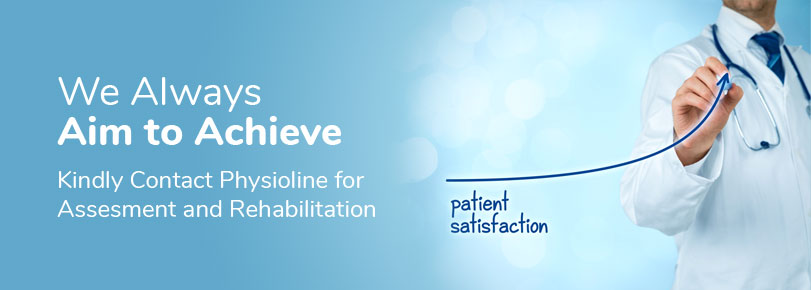
Video Testimonials
Success Stories
I had lost all hope about my poor child. It was devastating to see my child in such condition. It was taking a toll on my and my husband's health and our personal life was almost in shambles. We came to know about this rehabilitation center and thought of trying the services. I am so happy to state that only after a few sessions my child has shown remarkable improvement. He is much much better now. Thanks a lot.Parents of Master Shayan Parvez Menon, India Joubert Syndrome---Comprehensive Rehabilitation
I was detected with a brain tumour glioblastoma 2 yrs back and I was operated 1 yr back for the same. Since 6 months I have been on Chemotherapy. Because of tumor my left side is completely paralyzed and I was not able to walk, get up from the bed and transfer myself. I used to feel mentally very drained after the chemotherapy sessions but since the time I have started treatment from Physioline I am able to walk with support and post sessions I feel I am gaining lot of strength and endurance. Thanks to Physioline.MR AMIT RASTOGI Mumbai Brain Tumor operation
I am so thankful to Physioline for giving me my healthy life back. I had such bad back pain and pain in the left which had made my life miserable. My business was getting hampered, my life was so disturbed because of this pain all the time. Thanks to Physioline and the entire staff, they are very professional and at the same time caring in their approach. I am completely satisfied with the results.Mr. Hirjibhai Shah , Kenya Lumbar spondylosis (L4-L5) with pain to radiating to left leg---Physical Rehabilitation
